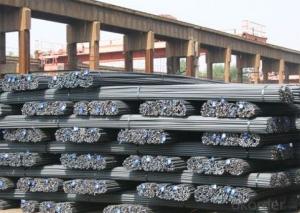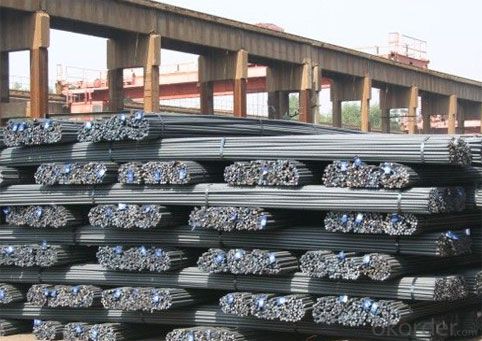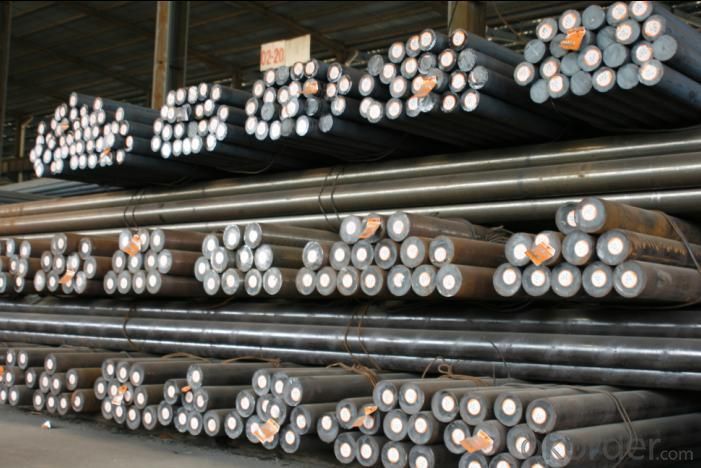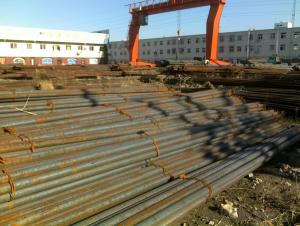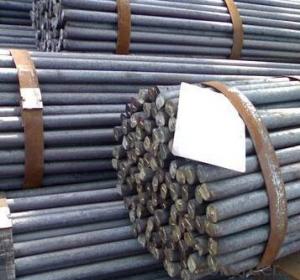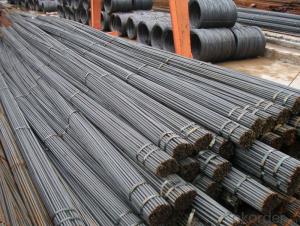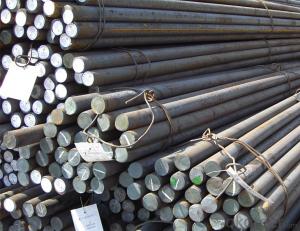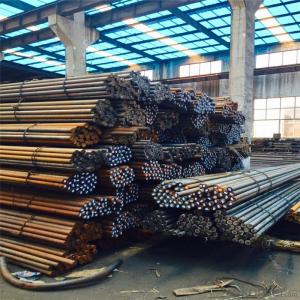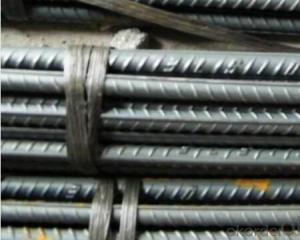Special Steel Reinforcing Steel Bars HRB500 Rebars
- Loading Port:
- China main port
- Payment Terms:
- TT OR LC
- Min Order Qty:
- 30 m.t.
- Supply Capability:
- 10000 m.t./month
OKorder Service Pledge
OKorder Financial Service
You Might Also Like
Specification
Product Information
1.Specification
Diameter(mm) | Φ6 ,Φ8,Φ10,Φ12,Φ13,Φ14,Φ16,Φ18,Φ20,Φ22,Φ25,Φ28,Φ32,Φ36,Φ40,Φ50 |
Length(m) | Unfolded / Straight Bundles weighing upto 2 Metric Tons and lengths is 6 Meters up to 15 Meters or according customers require |
U Shaped folded Bundles weighing up to 2 Metric Tons and lengths is 12 Meters | |
Rounded Coils ~ up to 2 Metric Ton Coils for Bending / Cutting Machine use. | |
Standard | GB(HRB335/HRB400/HRB500); |
BS4449 -1997 GRADE 250B, 460B; BS4449-2005 GRADE 500B; | |
ASTM A615 GRADE 40,GRADE60,GRADE75; ASTM A706; | |
DIN488-1 420S/500S, BST500S | |
JIS G3112 SD35, SD40, SD50,SD390 | |
NFA 35016 FE E 400, FE E 500 | |
CA 50/60 | |
GOST A3 R A500C | |
Surface finished | Screw-thread |
Epoxy coating | |
Galvanized coating | |
Production facility | Imports of production equipment from Italy |
Production capacity | 50,000 MT/month |
Payment term | T/T or 100% L/C at sight |
Package | In bundles. One bundles about 2-3tons |
2.Chemical composition
Grade | Technical data of the original chemical composition (%) | |||||
C | Mn | Si | S | P | B | |
HRB335 | ≤0.25 | ≤1.60 | ≤0.80 | ≤0.045 | ≤0.045 | >0.0008 |
Physics capability | ||||||
Yield Strength (N/cm2) | Tensile Strength (N/cm2) | Elongation (%)
| ||||
≥335 | ≥490 | ≥16 | ||||
Grade | Technical data of the original chemical composition (%) | |||||
C | Mn | Si | S | P | V | |
HRB400 | ≤0.25 | ≤1.60 | ≤0.80 | ≤0.045 | ≤0.045 | 0.04-0.12 |
Physics capability | ||||||
Yield Strength (N/cm2) | Tensile Strength (N/cm2) | Elongation (%)
| ||||
≥400 | ≥570 | ≥14 | ||||
3.Theorectical weight
Diameter (MM) | Cross Sectional Area (MM2) | Theorectical Weight (KG/M) | Weight of 12M Bar (KG) | A Ton Contains 12M Bars (PCS) |
6 | 28.27 | 0.222 | 2.664 | 375.38 |
8 | 50.27 | 0.395 | 4.74 | 210.97 |
10 | 78.54 | 0.617 | 7.404 | 135.06 |
12 | 113.1 | 0.888 | 10.656 | 93.84 |
14 | 153.9 | 1.21 | 14.52 | 68.87 |
16 | 201.1 | 1.58 | 18.96 | 52.74 |
18 | 254.5 | 2 | 24 | 41.67 |
20 | 314.2 | 2.47 | 29.64 | 33.74 |
22 | 380.1 | 2.98 | 35.76 | 27.96 |
25 | 490.9 | 3.85 | 46.2 | 21.65 |
28 | 615.8 | 4.83 | 57.96 | 17.25 |
32 | 804.2 | 6.31 | 75.72 | 13.21 |
36 | 1018 | 7.99 | 98.88 | 10.43 |
40 | 1257 | 9.87 | 118.44 | 8.44 |
Product Show
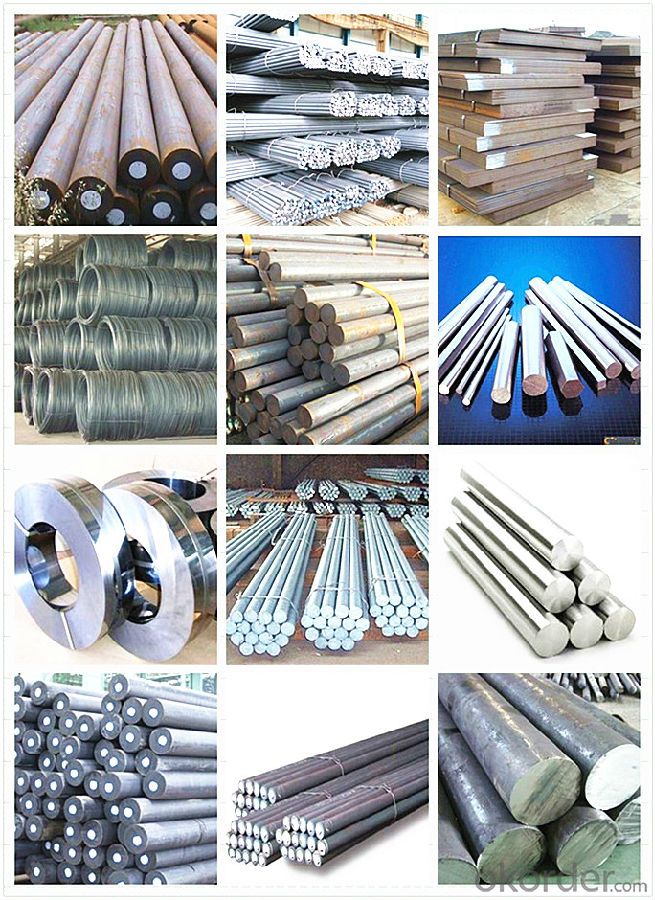
Workshop Show
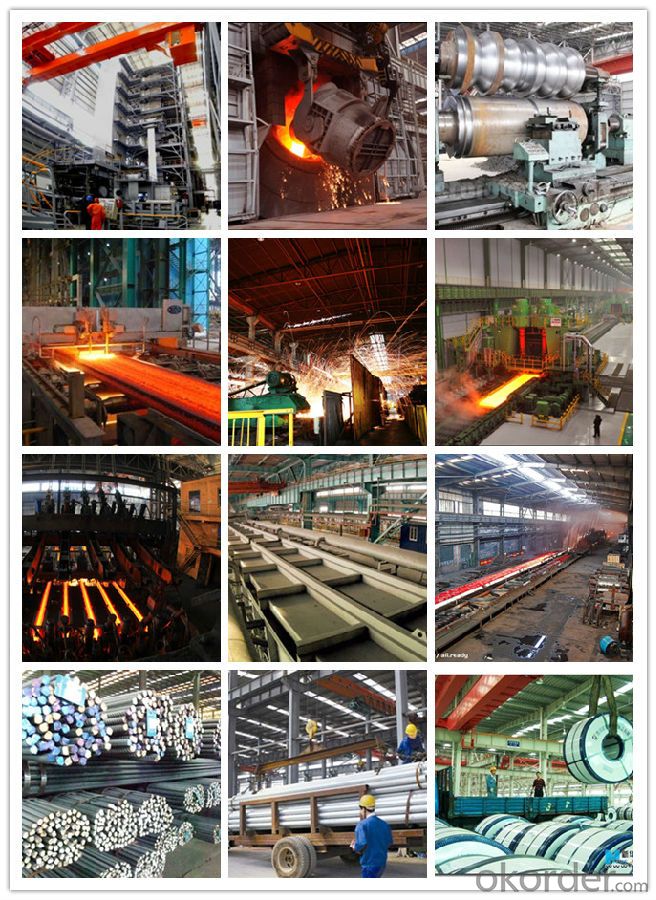
Shipping
1. FedEx/DHL/UPS/TNT for samples, Door-to-Door;
2. By Air or by Sea for batch goods, for FCL; Airport/ Port receiving;
3. Customers specifying freight forwarders or negotiable shipping methods!
Delivery Time: 3-7 days for samples; 5-25 days for batch goods.
Payment Terms
1.Payment: T/T, L/C, Western Union, MoneyGram,PayPal; 30% deposits; 70% balance before delivery.
2.MOQ: 1pcs
3.Warranty : 3 years
4.Package Informations: 1) EXPORT, In 20 feet (GW 25 ton) or 40 feet Container (GW 25 ton)
2)as customer's requirement
Why choose us?
(1) The leading exporter in China special steel industry.
(2) Large stocks for various sizes, fast delivery date.
(3) Good business relationship with China famous factories.
(4) More than 7 years steel exporting experience.
(5) Good after-sales service guarantee.
- Q: What are the different methods of surface finishing for special steel?
- There are several different methods of surface finishing for special steel, each offering unique benefits and achieving specific aesthetic or functional requirements. Some of the most commonly used methods include: 1. Electroplating: This process involves depositing a layer of metal onto the special steel surface through an electrochemical reaction. It provides enhanced corrosion resistance, improved appearance, and can also offer increased hardness or wear resistance. 2. Passivation: Passivation is a chemical treatment that removes surface contaminants and forms a thin oxide layer on the special steel. This process enhances corrosion resistance by preventing the formation of rust or other oxidation products. 3. Polishing: Polishing is a mechanical process that involves using abrasive materials to remove a thin layer of the steel surface, resulting in a smooth and shiny finish. This method is often used to improve the appearance of special steel products or to achieve a specific level of reflectivity. 4. Shot blasting: Shot blasting is a technique that involves propelling small metal beads or shots at high speed onto the special steel surface. This process removes scale, rust, or other surface contaminants, resulting in a clean and textured finish. Shot blasting is commonly used to prepare the steel for subsequent coating or painting applications. 5. Physical vapor deposition (PVD): PVD is a vacuum-based coating process that involves depositing a thin layer of material onto the special steel surface. This method offers excellent adhesion, wear resistance, and can provide various colors or finishes to enhance the aesthetics of the steel. 6. Powder coating: Powder coating involves applying a dry powder onto the special steel surface, which is then cured under heat to form a protective and decorative layer. This method offers excellent corrosion resistance, durability, and a wide range of color options. 7. Anodizing: Anodizing is an electrolytic process that creates a controlled oxide layer on the surface of certain special steel alloys. It provides increased corrosion resistance, improved appearance, and can also enhance hardness or wear resistance. These are just a few of the many methods available for surface finishing special steel. The choice of method will depend on factors such as the desired finish, functional requirements, and the specific properties of the steel being used.
- Q: How does special steel perform in abrasive wear conditions?
- Special steel is designed specifically to excel in conditions of abrasive wear, thanks to its unique composition and manufacturing process. This makes it highly resistant to the harmful effects of abrasion. The inclusion of alloying elements like chromium, manganese, and molybdenum in special steel significantly boosts its hardness and toughness. These elements aid in the formation of carbides within the steel matrix, which serve as barriers against abrasion. The carbides effectively withstand the forces exerted by abrasive particles, preventing them from inflicting significant damage on the steel surface. Additionally, special steel undergoes specialized heat treatment processes like quenching and tempering, further enhancing its resistance to abrasive wear. These processes not only increase the steel's hardness but also enhance its overall toughness and durability. As a result, special steel can withstand high levels of abrasion without experiencing substantial wear or deterioration. Moreover, special steel exhibits excellent corrosion resistance, in addition to its exceptional mechanical properties. This is achieved by incorporating elements such as chromium, which creates a protective oxide layer on the steel surface. The oxide layer acts as a barrier, preventing corrosive substances from reaching the underlying steel and causing further harm. In conclusion, special steel performs exceptionally well in conditions of abrasive wear. Its distinctive composition, heat treatment processes, and corrosion resistance properties make it an ideal material for applications where abrasion is a major concern. Whether in mining, manufacturing, or other industries prone to abrasive wear, special steel offers superior performance and extended lifespan, ensuring optimal efficiency and cost-effectiveness.
- Q: How does special steel perform in cryogenic impact resistance?
- Special steel performs well in cryogenic impact resistance due to its high strength, toughness, and ability to retain these properties at extremely low temperatures. This makes it suitable for applications requiring exceptional resistance to fracture and deformation under cryogenic conditions.
- Q: What are the specific requirements for special steel used in the chemical reactor industry?
- The special steel used in the chemical reactor industry can have varying specific requirements depending on the application and the chemicals being processed. However, there are generally expected requirements for this type of steel. First and foremost, the steel must possess outstanding resistance to corrosion. Chemical reactors often handle highly corrosive substances, such as acids, alkalis, and reactive chemicals. Hence, the steel must be able to withstand the corrosive effects of these substances to maintain the integrity and durability of the reactor. Secondly, the steel should exhibit resistance to high temperatures. Chemical reactions often require elevated temperatures to facilitate desired transformations. Therefore, the steel used in these reactors must be capable of enduring these high temperatures without compromising its structural integrity or experiencing significant deformation. Furthermore, the steel should possess favorable mechanical properties, including high strength and toughness. The reactor may undergo high pressure and mechanical stress during operation, so the steel needs to be able to withstand these conditions without failure. Additionally, the steel used in chemical reactors should be easily weldable and formable. This allows for convenient fabrication and construction of the reactor, ensuring a reliable and efficient manufacturing process. Moreover, the steel should have low levels of impurities, such as sulfur and phosphorus. These impurities can have adverse effects on the steel's corrosion resistance and mechanical properties. Therefore, the steel must adhere to stringent quality standards to ensure its suitability for use in the chemical reactor industry. In conclusion, the specific requirements for special steel used in the chemical reactor industry encompass excellent corrosion resistance, high temperature resistance, favorable mechanical properties, weldability, formability, and low impurity levels. Meeting these requirements is crucial to guarantee the safety, reliability, and efficiency of chemical reactors in various industrial processes.
- Q: How does special steel contribute to weight reduction in manufacturing?
- Special steel, engineered specifically for various manufacturing applications, possesses certain characteristics that make it suitable. One major advantage of special steel is its ability to reduce weight in manufacturing processes. Industries that prioritize weight reduction, such as automotive, aerospace, and construction, often utilize special steel. This is because special steel has a high strength-to-weight ratio, meaning it can provide the necessary strength and performance while being lighter compared to other materials. Using special steel allows companies to achieve weight reduction in multiple ways. Firstly, the lightweight nature of special steel enables the production of significantly lighter components and structures compared to conventional materials. This reduction in weight offers several benefits, including improved fuel efficiency in automobiles, increased payload capacity in aircraft, and easier handling and installation in construction projects. Moreover, special steel's high strength-to-weight ratio allows manufacturers to design and produce thinner yet equally strong components. This not only reduces overall weight but also optimizes material usage, leading to cost savings and a more sustainable manufacturing process. Additionally, special steel's unique properties, such as excellent formability and weldability, facilitate the creation of complex and intricate designs that further contribute to weight reduction. This versatility enables the production of lightweight components with intricate shapes and structures, enhancing overall performance and functionality. In conclusion, special steel is crucial in reducing weight during manufacturing processes. Its high strength-to-weight ratio, lightweight nature, excellent formability, and weldability enable the production of lighter components and structures. By utilizing special steel, industries can achieve improved efficiency, performance, and sustainability in their manufacturing operations.
- Q: What are the different international standards for special steel?
- There are several international standards for special steel that are recognized globally. Some of the prominent ones include: 1. AISI (American Iron and Steel Institute): AISI standards are widely used in North America and are often referred to as the SAE (Society of Automotive Engineers) standards. They provide specifications for various types of special steel alloys used in diverse applications. 2. ASTM (American Society for Testing and Materials): ASTM standards cover a wide range of materials, including special steel. These standards specify the chemical composition, mechanical properties, and testing procedures for various grades of special steel. 3. DIN (Deutsches Institut für Normung): DIN standards are commonly used in Germany and Europe. These standards define the composition, mechanical properties, and other characteristics of special steel alloys. 4. JIS (Japanese Industrial Standards): JIS standards are widely adopted in Japan and are recognized internationally. They provide specifications for special steel alloys used in different industries, including automotive, machinery, and construction. 5. BS (British Standards): BS standards are widely used in the United Kingdom and provide specifications for special steel alloys. These standards cover various aspects such as chemical composition, mechanical properties, and testing procedures. 6. ISO (International Organization for Standardization): ISO standards are globally recognized and provide specifications for a wide range of materials, including special steel. ISO standards ensure consistency and quality in the production and use of special steel alloys across different countries. These international standards play a crucial role in ensuring the quality, compatibility, and performance of special steel alloys used in various industries worldwide. They provide a common framework for manufacturers, suppliers, and consumers to communicate and ensure that the steel meets specific requirements and industry standards.
- Q: What are the challenges in welding special steel alloys?
- The challenges in welding special steel alloys include their high carbon content, which can result in increased hardness and potential cracking during the welding process. Additionally, these alloys often have a higher melting point, requiring specialized equipment and techniques for proper fusion. The presence of alloying elements can also lead to increased heat input and distortion, necessitating careful control of welding parameters. Lastly, the potential for intermetallic phase formation and reduced corrosion resistance in these alloys poses additional challenges in achieving strong and durable welds.
- Q: How does special steel contribute to the manufacturing of precision instruments?
- The manufacturing of precision instruments heavily relies on the use of special steel. This material possesses unique characteristics and properties that make it an ideal choice for such applications. To begin with, special steel boasts exceptional strength and durability, enabling precision instruments to withstand extreme conditions, heavy loads, and repetitive use. This quality ensures the longevity and reliability of these instruments, which is of utmost importance in critical industries such as aerospace, automotive, and medical. Furthermore, special steel exhibits excellent corrosion resistance, safeguarding the instruments from deterioration over time. This becomes particularly crucial for precision instruments that are exposed to a wide array of elements, chemicals, or moisture during their operation or storage. In addition, special steel provides high thermal stability, allowing precision instruments to maintain their accuracy even in varying temperature environments. This proves vital for instruments used in industries where temperature fluctuations may impact their performance, such as laboratories or manufacturing plants. Moreover, special steel can be tailored and customized to meet specific design requirements. It can be easily machined, formed, or welded into intricate shapes and parts, enabling manufacturers to create precision instruments with complex geometries and tight tolerances. This level of precision is essential for instruments utilized in fields like metrology, microscopy, or nanotechnology. Additionally, special steel possesses excellent magnetic properties, which can be advantageous for precision instruments that rely on magnetic fields for their operation. Examples of such instruments include magnetic resonance imaging (MRI) machines, compasses, or magnetometers. In conclusion, special steel significantly contributes to the manufacturing of precision instruments by providing strength, durability, corrosion resistance, thermal stability, customization options, and magnetic properties. These characteristics guarantee the performance, accuracy, and longevity of precision instruments, rendering them indispensable in various industries.
- Q: What are the different methods for joining special steel?
- There are several methods available for joining special steel, which is typically used in applications that require high strength, corrosion resistance, or specific mechanical properties. Some of the most common methods for joining special steel include: 1. Welding: This is the most common method used to join special steel. Different types of welding techniques can be employed, such as arc welding (including shielded metal arc welding, gas metal arc welding, and flux-cored arc welding), resistance welding (spot welding, seam welding), and laser welding. Welding requires the use of filler material to bond the steel pieces together, and it can produce strong and durable joints. 2. Brazing: Brazing involves joining special steel using a filler material (typically a brass or bronze alloy) with a lower melting point than the base steel. The filler material is heated until it melts and flows into the joint, creating a strong bond. Brazing is often used for joining dissimilar metals or when the base steel has a high melting point. 3. Soldering: Similar to brazing, soldering also involves using a filler material with a lower melting point to join special steel. However, soldering typically uses a non-ferrous filler material, such as tin-lead or tin-silver alloys. Soldering is commonly used for joining electronic components or delicate parts that cannot withstand high temperatures. 4. Mechanical Fastening: Special steel can also be joined using mechanical fasteners, such as bolts, screws, rivets, or clips. This method is often used when the joint needs to be easily disassembled, or when welding or brazing is not feasible or desirable. 5. Adhesive Bonding: Adhesive bonding involves using a specialized adhesive or glue to join special steel. This method is suitable for joining thin or delicate steel components or when the joint requires high resistance to vibration or shock. Adhesive bonding can provide a strong and durable bond, but it may not be suitable for high-temperature or high-stress applications. It is important to consider the specific requirements of the application, such as strength, corrosion resistance, temperature resistance, and the desired permanence of the joint, when selecting the appropriate method for joining special steel. Each method has its own advantages and limitations, and choosing the right method will ensure a strong and reliable joint.
- Q: Can special steel be used for structural applications?
- Yes, special steel can be used for structural applications. Special steel refers to steel that has been alloyed or modified to possess specific properties such as enhanced strength, durability, or corrosion resistance. These qualities make special steel suitable for various structural applications where high performance and reliability are required, such as in the construction of buildings, bridges, and offshore platforms.
Send your message to us
Special Steel Reinforcing Steel Bars HRB500 Rebars
- Loading Port:
- China main port
- Payment Terms:
- TT OR LC
- Min Order Qty:
- 30 m.t.
- Supply Capability:
- 10000 m.t./month
OKorder Service Pledge
OKorder Financial Service
Similar products
Hot products
Hot Searches
Related keywords
